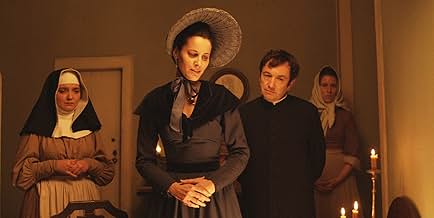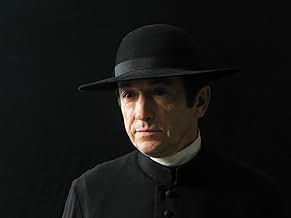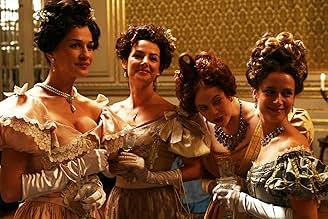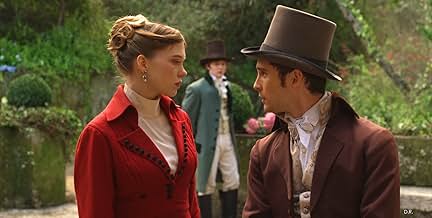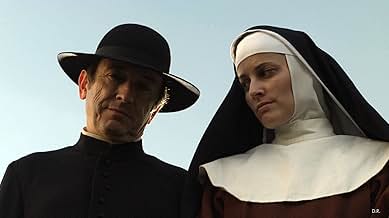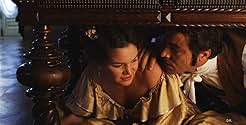CALIFICACIÓN DE IMDb
7.4/10
3.6 k
TU CALIFICACIÓN
Agrega una trama en tu idiomaFollows a jealous countess, a wealthy businessman, and a young orphaned boy across Portugal, France, Italy and Brazil where they connect with a variety of mysterious individuals.Follows a jealous countess, a wealthy businessman, and a young orphaned boy across Portugal, France, Italy and Brazil where they connect with a variety of mysterious individuals.Follows a jealous countess, a wealthy businessman, and a young orphaned boy across Portugal, France, Italy and Brazil where they connect with a variety of mysterious individuals.
Explorar episodios
Opiniones destacadas
Stylish and atmospheric costume drama.
The action takes us to Lisbon in the 19th century, where the fates, life and stories of several people are intertwined.
We have see the film of the cult Chilean director Raul Ruiz, who entire of conscious life make many author movies, for connoisseurs and aesthetes, with hidden meaning, filled with surreal and absurd images, but in his old age decided to aim at the adaptation of the historical adventure novel Castelo Branco, called Portuguese Balzac .
The film's action develops slowly and thoroughly, gradually dragging you into this whirlpool consisting of secrets, intrigues and fateful coincidences, adventures, violent passions, terrible revenge and insane love. And so minute by minute there is a complete immersion in the picture, because the secrets are always intriguing ...
It should be noted that the action in the film develops over several decades and covers a large number of characters and peoples (almost like G. G. Marquez), where almost every character has its own confusing story and secret, hidden very far away, which we will be told and revealed in the course of the film, hence the actual length of the film, divided into two parts.
I highly recommend to view. 9 out of 10.
The action takes us to Lisbon in the 19th century, where the fates, life and stories of several people are intertwined.
We have see the film of the cult Chilean director Raul Ruiz, who entire of conscious life make many author movies, for connoisseurs and aesthetes, with hidden meaning, filled with surreal and absurd images, but in his old age decided to aim at the adaptation of the historical adventure novel Castelo Branco, called Portuguese Balzac .
The film's action develops slowly and thoroughly, gradually dragging you into this whirlpool consisting of secrets, intrigues and fateful coincidences, adventures, violent passions, terrible revenge and insane love. And so minute by minute there is a complete immersion in the picture, because the secrets are always intriguing ...
It should be noted that the action in the film develops over several decades and covers a large number of characters and peoples (almost like G. G. Marquez), where almost every character has its own confusing story and secret, hidden very far away, which we will be told and revealed in the course of the film, hence the actual length of the film, divided into two parts.
I highly recommend to view. 9 out of 10.
Mistérios de Lisboa is shown in the United States with the title Mysteries of Lisbon (2010). The film is directed by the extraordinary Chilean director, Raoul Ruiz. Ruiz, who died in 2011, had directed 115 films. (Not a typo--one hundred and fifteen.)
The film is based on a novel by the Portuguese author Camilo Castelo Branco. (Unfortunately, the novel isn't available in English translation.) It's also frustrating that the DVD available in the U.S. is a shortened version of the original miniseries. (266 minutes vs. 360 minutes. What was left out of the shorter version?)
The film is hard to describe because there are stories within stories within stories. The basic plot--more or less--revolves around a boy attending a Catholic school in early 19th Century Portugal. The boy doesn't know the identity of his mother and father. He doesn't even know his last name.
We eventually meet his mother, her husband, and--in flashback--his father. We also meet elegant women in sumptuous gowns, men for whom dueling is a way of life, and endless numbers of servants who are always watching and listening.
Some mysteries are never resolved. For example, there's a young woman who is the mistress of one of the nobles. When he dies, she refuses to accept any of his inheritance. She turns up again as the wife of an extremely wealthy, cruel man. Then she disappears from the plot. (Was her story edited out, or did she just disappear?)
Ultimately, I think the key to the plot is the priest Padre Dinis, played extremely well by Adriano Luz. He--like almost all of the the characters--turns out to have a surprising past.
Other IMDb reviewers have commented on the costumes, which are incredibly attractive. Two main characters who appear in those costumes are Maria João Bastos as a Portuguese noblewoman and Clotilde Hesme as a French noblewoman. Both of them are extremely beautiful in a European, non-Hollywood way. They appear to have been born to wear those costumes.
At the very end of the movie the young man, now grown, encounters some beggars. One of them tells him, "With the nobility, it's all about their honor. We poor people know these things happen, and we take them as part of life." When I thought about it, those sentences encompasses Mysteries of Lisbon. Nobles fight duels and spend endless effort and resources to protect the honor of their family. One man goes so far as to order the killing of his grandchild, because the child is born out of wedlock. Huge events are taking place around them--the Napoleonic wars, the Portuguese civil war--but what really matters is their rigid code of honor.
We saw this movie on DVD, and it worked well enough. However, almost every frame of the film would be a beautiful still. Many scenes look like lush paintings--Baroque, rather than 19th Century. That's why I believe the film would work better on the large screen. However, if no screening is available, buy the DVD. It's not a movie you want to miss!
The film is based on a novel by the Portuguese author Camilo Castelo Branco. (Unfortunately, the novel isn't available in English translation.) It's also frustrating that the DVD available in the U.S. is a shortened version of the original miniseries. (266 minutes vs. 360 minutes. What was left out of the shorter version?)
The film is hard to describe because there are stories within stories within stories. The basic plot--more or less--revolves around a boy attending a Catholic school in early 19th Century Portugal. The boy doesn't know the identity of his mother and father. He doesn't even know his last name.
We eventually meet his mother, her husband, and--in flashback--his father. We also meet elegant women in sumptuous gowns, men for whom dueling is a way of life, and endless numbers of servants who are always watching and listening.
Some mysteries are never resolved. For example, there's a young woman who is the mistress of one of the nobles. When he dies, she refuses to accept any of his inheritance. She turns up again as the wife of an extremely wealthy, cruel man. Then she disappears from the plot. (Was her story edited out, or did she just disappear?)
Ultimately, I think the key to the plot is the priest Padre Dinis, played extremely well by Adriano Luz. He--like almost all of the the characters--turns out to have a surprising past.
Other IMDb reviewers have commented on the costumes, which are incredibly attractive. Two main characters who appear in those costumes are Maria João Bastos as a Portuguese noblewoman and Clotilde Hesme as a French noblewoman. Both of them are extremely beautiful in a European, non-Hollywood way. They appear to have been born to wear those costumes.
At the very end of the movie the young man, now grown, encounters some beggars. One of them tells him, "With the nobility, it's all about their honor. We poor people know these things happen, and we take them as part of life." When I thought about it, those sentences encompasses Mysteries of Lisbon. Nobles fight duels and spend endless effort and resources to protect the honor of their family. One man goes so far as to order the killing of his grandchild, because the child is born out of wedlock. Huge events are taking place around them--the Napoleonic wars, the Portuguese civil war--but what really matters is their rigid code of honor.
We saw this movie on DVD, and it worked well enough. However, almost every frame of the film would be a beautiful still. Many scenes look like lush paintings--Baroque, rather than 19th Century. That's why I believe the film would work better on the large screen. However, if no screening is available, buy the DVD. It's not a movie you want to miss!
This series of short stories set in a world long gone is of course a costume drama, that may therefore deter some. They would be mistaken. It is slow, considered, colorful and in my view a good introduction to the world of our ancestors, who held opinions different from ours, did things in a different way, and got upset about the same issues, yet in a different clothing. Love that is thwarted, wise padres, noble families with poor youngest children and all of that in a heavily draped world - sometimes a bit much. And yet I may recommend that you sit down, do not hurry, leave your perhaps preconceived ideas at the entrance, and enjoy these so many hours of romantic stories.
When Raoul Ruiz adapts existing material, he tends to reconfigure the narrative in a playful way, often obliterating all coherence in the process. In his writings on film, specifically Poetics of Cinema, he is quite critical of what he calls central conflict theory. The idea behind this theory is that narrative, especially film narrative, must be built around a single conflict and that every aspect of the plot must build on this conflict one way or another. Ruiz noticed this phenomenon and gave it a name, but it was so common that popular screen writing guides used it as an incontrovertible rule. Poetics of Cinema is devoted almost entirely to explaining and criticizing central conflict theory. Ruiz was never content merely to criticize this simplistic yet ubiquitous narrative structure in writing, however; commentary on it is often embedded in the films he makes. Unsurprisingly, his films intentionally eschew anything resembling this structure but they tend to go even further and offer playful deconstructions of the concept.
Although I can't claim much familiarity with the novel Ruiz is adapting in Mysteries of Lisbon (it apparently hasn't been translated to English yet) it undoubtedly lends itself especially well to his ludic, subversive style. Rather than follow the conflict of a single continuous narrative, Mysteries of Lisbon explores several interrelated narrative strands that complement one another unusually well as they're full of cases of important coincidental relationships and frustrated love affairs. Thus, Ruiz has less to subvert and more to emphasize.
Ruiz's visual style has always been highly unusual. He favors the frequent use of Dutch angles and he often creates startling juxtapositions with his unusual framing techniques and occasional superimpositions. While these unusual techniques are always welcome, they can become somewhat exhausting when they occur frequently. Since Mysteries of Lisbon is unusually long (the version I watched was around 260 minutes) it's perhaps unsurprising that Ruiz manages to space these out carefully enough to draw attention to all the right places and break up the monotony of the more conventional period piece style he favors in this film. Even at its least inspired, however, Mysteries of Lisbon offers far more visual stimulation than the stuffy fidelity of a film by Merchant and Ivory or Oscar fodder such as The King's Speech. Unlike most directors working with similar material, Ruiz captures vast landscapes and baroque interiors with the same effortless mastery. Even the frequent long takes are made more interesting by carefully employed tracking shots.
Mysteries of Lisbon represents the rare combination of a director at the top of his game working with material perfectly suited for his unique sensibilities. Cinema doesn't get much better than this.
Although I can't claim much familiarity with the novel Ruiz is adapting in Mysteries of Lisbon (it apparently hasn't been translated to English yet) it undoubtedly lends itself especially well to his ludic, subversive style. Rather than follow the conflict of a single continuous narrative, Mysteries of Lisbon explores several interrelated narrative strands that complement one another unusually well as they're full of cases of important coincidental relationships and frustrated love affairs. Thus, Ruiz has less to subvert and more to emphasize.
Ruiz's visual style has always been highly unusual. He favors the frequent use of Dutch angles and he often creates startling juxtapositions with his unusual framing techniques and occasional superimpositions. While these unusual techniques are always welcome, they can become somewhat exhausting when they occur frequently. Since Mysteries of Lisbon is unusually long (the version I watched was around 260 minutes) it's perhaps unsurprising that Ruiz manages to space these out carefully enough to draw attention to all the right places and break up the monotony of the more conventional period piece style he favors in this film. Even at its least inspired, however, Mysteries of Lisbon offers far more visual stimulation than the stuffy fidelity of a film by Merchant and Ivory or Oscar fodder such as The King's Speech. Unlike most directors working with similar material, Ruiz captures vast landscapes and baroque interiors with the same effortless mastery. Even the frequent long takes are made more interesting by carefully employed tracking shots.
Mysteries of Lisbon represents the rare combination of a director at the top of his game working with material perfectly suited for his unique sensibilities. Cinema doesn't get much better than this.
Mysteries of Lisbon in my view is utterly mesmerising, and one of those rare cases where there is no bad thing about it. As an adaptation of the novel, it succeeds wonderfully, on its own terms it is even more impressive. Mysteries of Lisbon may be lengthy at just over four and a half hours. But because everything was so well done, there was not a single moment where I was not transfixed.
On a visual standpoint, Mysteries of Lisbon looks amazing. The photography is gorgeous complete with beautiful-looking scenery and costumes, while there is an atmospheric and striking colour palette. The music does a fine job in conveying the mood of each scene, with not one scene feeling musically out of place.
Mysteries of Lisbon also benefits from a brilliant story. There are several story lines developed (very well) and incorporated throughout, but the main crux of the story told here is so unique and compelling it drew me in immediately. The script is of exceptional quality, often very moving, literate and thoughtful, while the characters have a complexity while being intriguing as well.
When it comes to the acting, there is not a single bad performance, Luz especially in the lead is fantastic. And throughout the direction is superb. Overall, this is mesmerising and highly recommended. 10/10 Bethany Cox
On a visual standpoint, Mysteries of Lisbon looks amazing. The photography is gorgeous complete with beautiful-looking scenery and costumes, while there is an atmospheric and striking colour palette. The music does a fine job in conveying the mood of each scene, with not one scene feeling musically out of place.
Mysteries of Lisbon also benefits from a brilliant story. There are several story lines developed (very well) and incorporated throughout, but the main crux of the story told here is so unique and compelling it drew me in immediately. The script is of exceptional quality, often very moving, literate and thoughtful, while the characters have a complexity while being intriguing as well.
When it comes to the acting, there is not a single bad performance, Luz especially in the lead is fantastic. And throughout the direction is superb. Overall, this is mesmerising and highly recommended. 10/10 Bethany Cox
¿Sabías que…?
- ErroresThe movie is set during the late 1700's to early 1800's. During the ballroom scene, several shots make it obvious that the gowns worn by the women have zippers in the back but the zipper wasn't invented until 1851.
- Versiones alternativasAlso exists as a shorter (by about an hour), theatrically released, feature film version, Mistérios de Lisboa (2010).
- ConexionesEdited from Mistérios de Lisboa (2010)
Selecciones populares
Inicia sesión para calificar y agrega a la lista de videos para obtener recomendaciones personalizadas
- How many seasons does Mysteries of Lisbon have?Con tecnología de Alexa
Detalles
- Fecha de lanzamiento
- Países de origen
- Sitios oficiales
- Idiomas
- También se conoce como
- Mysteries of Lisbon
- Locaciones de filmación
- Productoras
- Ver más créditos de la compañía en IMDbPro
Contribuir a esta página
Sugiere una edición o agrega el contenido que falta

Principales brechas de datos
By what name was Mistérios de Lisboa (2011) officially released in India in English?
Responda


